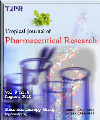
|
Tropical Journal of Pharmaceutical Research
Pharmacotherapy Group, Faculty of Pharmacy, University of Benin, Benin City, Nigeria
ISSN: 1596-5996
EISSN: 1596-5996
Vol. 9, No. 6, 2010, pp. 565-572
|
 Bioline Code: pr10068
Bioline Code: pr10068
Full paper language: English
Document type: Research Article
Document available free of charge
|
|
|
Tropical Journal of Pharmaceutical Research, Vol. 9, No. 6, 2010, pp. 565-572
| en |
PFCRT and DHFR-TS Sequences for Monitoring Drug Resistance in Adzopé Area of Côte d’Ivoire After the Withdrawal of Chloroquine and Pyrimethamine
Ouattara, L.; Bla, K.B.; Assi, S.B.; Yavo, W. & Djaman, A.J.
Abstract
Purpose: Drug resistance is probably the greatest challenge to most malaria-control programmes. The goal of this study was to evaluate polymorphisms in parasite resistance gene markers, pfcft and dhfr, from falciparum malaria isolates collected in Adzopé City, Côte d’Ivoire in 2007.
Methods: Blood samples were collected in filter paper from 72 children infected with Plasmodium falciparum living in Adzopé area. Plasmodium falciparum DNA was extracted and nested PCRs were performed using specific primers of pfcrt and dhfr-ts. During the study, chloroquine and sulphadoxinepyrimethamine (which previously were the first-and second-line treatments, respectively, for malaria in Côte d’Ivoire) were not given to the enrolled children, having been withdrawn in 2004.
Results: The results revealed the presence of the mutant-type pfcrt and dhfr-ts in 51 (62.2 %) and 29 (35.4 %) samples, respectively. The mutant-type pfcrt alleles consisted of four single mutations (Met74/Asn75/Thr76) and 47 triple mutations (Ile74/Glu75/Thr76). However, the frequency distribution of mutations in dhfr-ts was 35.4 % for dhfr-Asn108, 17 % for dhfr-Ile51 and 21 % for dhfr-Arg59.
Conclusion: The results of this study show high presence of chloroquine (CQ) resistance markers while for sulphadoxine-pyrimethamine (SP), a much lower prevalence was detected for the markers under study. Chloroquine remains an inadequate drug for malaria therapy in the study region. Furthermore, in spite of the official withdrawal of CQ and SP in favour of the arteminisin-based combinations (ACTs), it appears the population of this area continues to use the drugs via self-medication.
Keywords
Côte d’Ivoire, Plasmodium falciparum, Malaria resistance, Molecular markers
|
| |
© Copyright 2010 Tropical Journal of Pharmaceutical Research.
Alternative site location: http://www.tjpr.org
|
|
